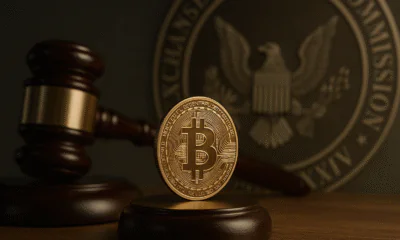Interviews
Philip Moustakis, Counsel at Seward & Kissel LLP – Interview Series

Philip advises companies and individuals on SEC enforcement matters, including criminal enforcement investigations, internal investigations, and cryptocurrencies and blockchain technology.
Philip has extensive experience with securities enforcement matters. For more than a decade prior to entering private practice, he served as senior counsel in the SEC’s Division of Enforcement, investigating and prosecuting complex matters involving violations of the federal securities law.
Before being employed with Seward & Kissel LLP you were a member of the SEC’s Cyber Unit which focused on cryptocurrencies and ICOs. How were you initially recruited for this Cyber Unit?
I started in the SEC’s Enforcement Division in 2008 and began working on Bitcoin and cryptocurrency-related matters about five years prior to the creation of the SEC Cyber Unit. I brought the SEC’s first Bitcoin-related enforcement action against the operator of Bitcoin Savings & Trust and led other cryptocurrency-related matters as well. I briefed Chair Mary Jo White and the other Commissioners, and frequently conducted training for the FBI, FINRA, and others, on Bitcoin and blockchain technology. I also presented in academic settings on my work. So, when the Cyber Unit was formed in 2017, with a mandate that included cryptocurrencies and ICOs, I was a natural fit.
How did the action against ‘Bitcoin Savings and Trust' influence future enforcement actions by the SEC?
Bitcoin Savings and Trust, which raised a staggering 700,000 Bitcoins from investors, was charged as a plain vanilla Ponzi scheme, with the exception that all investments were solicited, and purported returns paid, in bitcoins. But it was notable for several reasons. First, it established that the investment of Bitcoins could satisfy the “investment of money” prong of the test for an investment contract, otherwise known as the Howey test. Second, it demonstrated that the SEC could conduct a flow-of-funds analysis on the Bitcoin blockchain. While we could not demonstrate where every Bitcoin came from or went, we could show that more Bitcoins were going out to investors than came into Bitcoin Savings and Trust from any source other than investors, thereby proving the Ponzi. Third, we did not take the position that Bitcoin itself was a security. And finally, the case was significant for the disgorgement theory advanced by the SEC, namely, that the disgorgement ordered by the court should reflect the dramatic increase in the value of Bitcoins from the time the investors handed their Bitcoins over to the defendant, to the date of the judgment. The Bitcoins the defendant raised from investors were worth about $4.5 million at the time, but the final judgment against the defendant was for more than $40 million in disgorgement and penalties.
You were a founding member of the SEC’s Distributed Ledger Technology Working Group. What is the purpose of this group, and how does it impact both investors and STOs?
With the wider adoption of blockchain technology, the SEC’s Distributed Ledger Technology Working Group was simply an effort to coordinate both with other regulators and within the SEC. It was important to ensure the various divisions and offices of the SEC were not working at cross-purposes with one another. The SEC has since built on the work of the group with the creation of its Strategic Hub for Innovation and Financial Technology (FinHub), which engages in outreach to both investors and issuers.
You were responsible for investigations into multiple initial coin offerings (ICOs) for possible violations of securities laws. What’s the most blatant violation of securities law that you have witnessed?
Without hesitation, it’s the ICO craze of 2017 and 2018. In February 2018, SEC Chairman Jay Clayton, testifying before the Senate Committee on Banking, Housing, and Urban Affairs, famously said, “I believe every ICO I’ve seen is a security.” A few months later, in a televised interview, Commissioner Robert Jackson said, “if you want to know what our markets would look like with no securities regulation, the answer is the ICO market.” On the whole, I agree with those sentiments. Most ICOs, during that period, were traditional capital raises, with the basic difference being that, in an ICO, one could purchase shares in a company’s primary asset rather than shares in the company itself. It’s not to say that most ICOs were frauds or not well-intentioned. However, there wasn’t much ambiguity about the fact that they were unregistered securities offerings.
It’s common practice for ICOs to block investments from USA investors. Nonetheless, those same blocked investors can then later purchase these tokens on cryptocurrency exchanges. Does this strategy of initially blocking USA investors keep ICOs safe from SEC enforcement action?
The short answer is no. If an issuer accesses the U.S. capital markets, if it offers or sells securities in the U.S., directly or indirectly, the SEC will have jurisdiction. The SEC has made it clear that it is not sufficient to take cosmetic or half measures to prevent one’s security token offering (STO) from reaching U.S. investors.
Do you believe that the SEC will become more proactive in pursuing legal action and shutting down unregulated cryptocurrency exchanges?
Yes. Bringing enforcement actions against exchanges that decline to come into compliance for whatever reasons, despite the SEC’s messaging in the space, makes sense for the Enforcement Division. Not only to give teeth to prior statements by the Chairman, other commissioners, and certain members of senior management, but also because an enforcement action against an exchange, on the whole, should have a greater programmatic impact from a regulatory perspective than an action against a single issuer.
Do you have any comments regarding the SEC’s most recent actions against Telegram Group Inc and its unregistered securities offering?
In my view, there are a couple of important takeaways. First, related to your earlier question, the Telegram case demonstrates the SEC will pursue overseas issuers of digital assets or cryptocurrencies who offer or sell those assets into the U.S., or otherwise access the U.S. capital markets. Additionally, I think this could be an interesting test case for the utility token argument. Telegram has taken the position that, while the token purchase agreement for the Gram was a security, the token itself is not. In its complaint against Telegram, the SEC alleged there was no daylight between the Gram offering and the Gram token. Rather, the SEC alleged, the offering was a traditional capital raise because, among other things: the company used funds raised for operations and to build out its ecosystem; there were no goods or services for which one might use the Gram; and Gram purchasers had and – absent the emergency action – would continue to have a reasonable expectation of sharing in the company’s profits should it succeed in building out the functionalities it promised. It will be interesting to see how the facts and arguments develop on this issue as the litigation progresses.
Could you share with us details regarding your current role with Seward & Kissel LLP?
I joined Seward & Kissel in February 2019 and work closely with several of the firm’s practice areas in both New York and D.C., including the Government Enforcement and Internal Investigations, Investment Management, and Blockchain and Cryptocurrency Groups. I spent the majority of my career at the SEC in the Enforcement Division’s Asset Management Unit, and Seward & Kissel has one of the largest and well-known Investment Management practices in the U.S., working with managers across all asset classes, including digital assets. As a result, much of my current practice centers on counseling our investment management clients on SEC and other regulatory examinations, investigations, and enforcement matters; internal investigations; and digital asset offerings. I have also been asked to lead the Enforcement Committee for the Virtual Commodity Association in connection with its efforts to establish a self-regulatory organization (SRO) for cryptocurrency marketplaces.
What are some recommendations that you have for companies that are considering launching an STO?
In my view, the best course of action is to engage counsel with deep knowledge of both securities law and cryptocurrency. While some lawyers have gotten up to speed on blockchain technology, many may be doing their clients a disservice because they are not as well versed in the fundamentals of the securities laws.
At what stage should companies who are considering launching an STO contact you or other legal counsel?
The earlier the better – ideally before any contact with a regulator, and certainly before the offer or sale of any token.
Is there anything else that you would like to share with our audience?
The SEC’s enforcement actions against ICO issuers clearly have had an impact on the market. However, Telegram, Block.one, and Kik were just three of the larger ICOs from the 2017-2018 period. We should see more such cases in the coming months or year. The SEC has brought enforcement actions against celebrity promoters of digital assets, but I would expect a continued focus by the SEC on promoters and sellers. It’s worth noting that one stated goal of SEC enforcement actions is to change the behavior of market participants, so I anticipate the SEC will continue to police digital asset exchanges and trading platforms. It’s the natural next step for the SEC after the issuers and promoters and, as I mentioned, an opportunity to have a wider impact on the market. In a similar vein, while a substantial number of the SEC’s enforcement actions in the space have involved alleged Ponzi schemes or offering frauds, with a continued focus on exchanges and trading platforms, I would not be surprised if, not before long, the SEC unearths more complex frauds involving market manipulation schemes or other market abuses. However, even well-intentioned market participants can be swept up in this and can find themselves the subject of enforcement attention as the SEC continues its efforts to increase industry compliance with securities laws and regulations. Seward & Kissel has been advising clients in financial services, corporate financing, and capital markets for more than 125 years. Our lawyers have extensive experience with STOs and digital asset offerings.
For more information or to consult with legal matters please visit Seward & Kissel LLP, or visit their Twitter or LinkedIn page.












